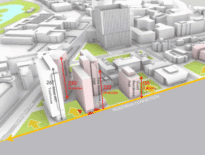There is little disagreement that Massachusetts faces a housing affordability crisis, with costs soaring amid a limited supply.
But when it comes to what to do about it, housing advocates often fall into two camps, offering very different solutions: those who say the key is boosting supply by eliminating restrictions that make it hard to build more housing – especially more affordable, modest-sized homes – and others who say we can’t build our way out of the crisis fast enough and should cap rents to stop landlords from gouging tenants in a tight market.
Massachusetts voters may now be asked to weigh in on the competing ideas. Two groups advancing sharply differing answers to the housing crisis say they will work to put questions on the 2026 state ballot aimed at addressing the problem.
A group pushing a housing growth approach filed a petition on Tuesday with the attorney general’s office that would reduce the minimum lot size that communities can maintain for single-family homes. Meanwhile, a group of housing advocates plans to file a petition on Wednesday for a ballot question that would allow cities and towns to adopt rent control.
The petition legalizing rent control is being filed on Wednesday by Homes for All Mass, a statewide coalition of housing groups, and would reverse a decision made by voters through a ballot question more than 30 years ago.
“Working-class and middle-class people who do the jobs that keep our state going should be able to afford a roof over our heads. But right now, out-of-control housing costs are making it impossible for hundreds of thousands of families in Massachusetts to make ends meet,” said Rose Webster-Smith, director of Springfield No One Leaves. “We need rent stabilization to keep rent costs reasonable and predictable, so that renters can save and have a fair shot at the dream of owning a home.”
The proposed new law would allow communities to cap annual rent increases to 5 percent. It would exempt owner-occupied buildings with four or fewer units as well as newly constructed housing for the building’s first 10 years.
Rent control in Massachusetts was abolished in 1994 through a statewide ballot question backed by landlords. At the time, only three communities had some form of rent control in place – Boston, Cambridge and Brookline. The ballot measure was narrowly approved, though it was rejected in the three communities that had rent regulation.
Talk of a potential rent control ballot measure has been circulating since the height of the COIVID pandemic, which brought the issue of housing insecurity to the forefront.
Citing an unreasonable rise in costs facing tenants, Mayor Michelle Wu pushed in 2023 for state authorization for Boston to be able to limit rent increases, but the Legislature has balked at reintroducing a policy the state scrapped three decades earlier.
Critics say rent control is the wrong way to address housing affordability, arguing that it stifles interest in developing new housing.
“Imposing rent control or any other policy that disincentivizes folks from building and supplying the housing we need is dangerous,” said Andrew Mikula, a senior housing fellow at the Pioneer Institute, a free-market-oriented Boston think tank. “That’s not to say we don’t need rental assistance for folks, especially those who, in the short term, have a slim chance of being able to afford any market-rate homes.”
Mikula is leading a group billing itself Legalize Starter Homes, which filed a petition Tuesday for a ballot question that would prevent municipalities from requiring minimum lot sizes greater than 5,000 square feet for single-family homes and frontage requirements greater than 50 feet in residential areas with existing water and sewer infrastructure. Mikula said inadequate supply is “at the root” of the regional housing affordability crisis, something that can only be addressed by making it easier to build more homes at lower price points.
“There’s a mountain of academic evidence that minimum lot sizes increase the price of housing and decrease the production rate of new housing,” said Mikula. He said the effort is aimed at spurring housing development that would address the state’s “severe shortage of housing, especially starter homes affordable to first-time buyers and seniors looking to downsize.”
Petitions must come with the signature of at least 10 voters. Along with Mikula, the starter home petition signatories include Jesse Kanson-Benanav of the pro-growth group Abundant Housing, Harvard economics professor Ed Glaeser and Greg Reibman, president and CEO of the Charles River Chamber, which covers Newton, Needham, Watertown and Wellesley.
The rent control measure is certain to face strong opposition from the real estate sector, while residents and local leaders in suburban communities are likely to bristle at the idea of reducing required minimum lot sizes. Such proposals often face opposition from those who say they would alter a community’s “character.”
For the two measures to end up on the November 2026 ballot, supporters must secure 75,000 signatures of registered voters by late November. They then need to gather a further 12,000 signatures by July, provided that the Legislature has not opted to pass the proposal into law.
With housing costs registering as a top priority for voters in polls, local and state elected officials will likely be pressed to stake out positions on the questions.
While the two ballot proposals reflect sharply differing views on the housing affordability crunch, leaders of the efforts concede that their approach alone won’t solve the state’s housing crisis.
Mikula said that boosting housing supply won’t be enough for some low-income residents who still require rental assistance. Meanwhile, members of the coalition behind the rent control proposal said it is just part of the solution – along with the need for more housing construction.
“As the state works to build more affordable housing over the coming years, we need rent stabilization to protect workers, families and seniors from out-of-control housing costs today,” said Noemi “Mimi” Ramos, executive director of New England Community Project, a Boston-based community group.
This article first appeared on CommonWealth Beacon and is republished here under a Creative Commons Attribution-NoDerivatives 4.0 International License.![]()







